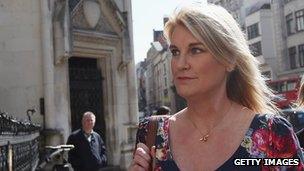High Court: Sally Bercow's Lord McAlpine tweet was libel
- Published

A tweet published by Sally Bercow about Tory peer Lord McAlpine was libellous, the High Court has ruled.
The wife of Commons Speaker John Bercow tweeted two days after BBC Newsnight wrongly linked a "leading Conservative politician" to sex abuse claims.
Amid widespread speculation about his identity, she wrote: "Why is Lord McAlpine trending. *innocent face*."
Mrs Bercow said she was "disappointed" by the ruling but the peer's lawyer said she had caused "unnecessary pain".
After the ruling by Mr Justice Tugendhat in Lord McAlpine's favour, Mrs Bercow said she had accepted a settlement with the peer's lawyers.
The amount of damages has not been disclosed.
'Seen sense'
Last November, Newsnight implicated a Thatcher-era politician in allegations that boys were sexually abused while in the care of a children's home in Wales in the 1970s and 1980s, but it did not name Lord McAlpine.
The former Conservative Party treasurer was then wrongly identified on the internet.
Lord McAlpine's solicitor, Andrew Reid: "It's been a great strain both for [Lord McAlpine] and his wife."
The BBC apologised unreservedly to Lord McAlpine and settled his defamation claim for £185,000.
Speaking after the ruling on Friday, Lord McAlpine's solicitor Andrew Reid said: "The failure of Mrs Bercow to admit that her tweet was defamatory caused considerable unnecessary pain and suffering to Lord McAlpine and his family over the past six months.
"With knowledge of the judgment, I am pleased to be able to say that Mrs Bercow has finally seen sense and has accepted an offer of settlement, which Lord McAlpine made back in January."
After publishing her comment about Lord McAlpine, Mrs Bercow apologised in four subsequent tweets but denied that her original tweet had been defamatory.
Mr Justice Tugendhat dismissed Mrs Bercow's argument that the question she had posed was entirely neutral.
Her inclusion of the words "innocent face" revealed that the question was "ironical", the judge ruled.
The tweet therefore amounted to an accusation that the Conservative peer was a "paedophile who was guilty of sexually abusing boys living in care".
'Nightmare'
In a statement, Mrs Bercow responded: "I will accept the ruling as the end of the matter. I remain sorry for the distress I have caused Lord McAlpine and I repeat my apologies.
"I did not tweet this with malice, and I did not intend to libel Lord McAlpine. I was being conversational and mischievous, as was so often my style on Twitter."
She went on: "I very much regret my tweet, and I promptly apologised publicly and privately to Lord McAlpine for the distress I caused him. I also made two offers of compensation.
"Lord McAlpine issued proceedings and the last few months have been a nightmare. I am sure he has found it as stressful as I have. Litigation is not a pleasant experience for anyone."
Mrs Bercow said she had learned her lesson "the hard way", adding that the ruling should be seen as "a warning to all social media users" because comments could sometimes be "held to be seriously defamatory, even when you do not intend them to be defamatory and do not make any express accusation".
As the case unfolded, Mrs Bercow's QC, William McCormick, had argued that the phrase "innocent face" was merely an indication that the tweet should be read in a deadpan manner, comparable to stage directions or notation on a musical score.
But Lord McAlpine's barrister, Sir Edward Garnier QC, said only "a moron in a hurry" or an "anchorite in a sealed cave" would have been unfamiliar with the context in which the tweet was published.
- Published16 May 2013
- Published24 May 2013
- Published26 February 2013
- Published15 November 2012